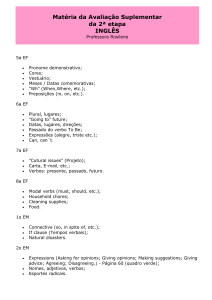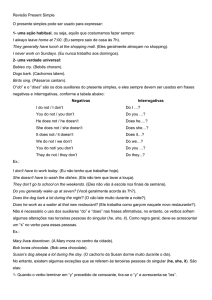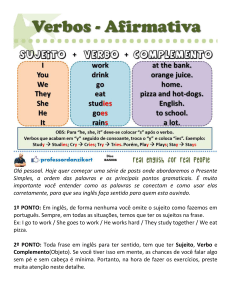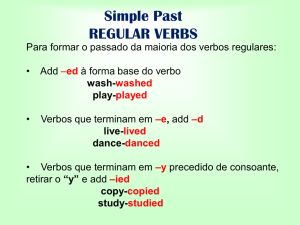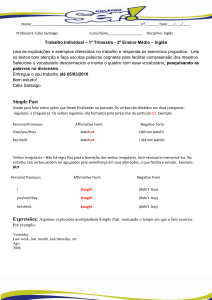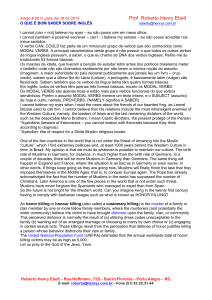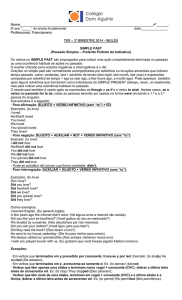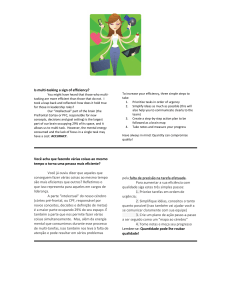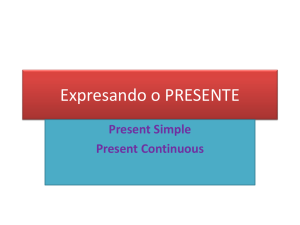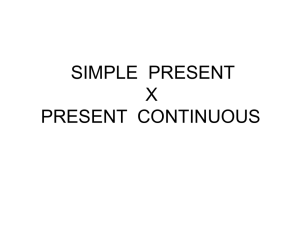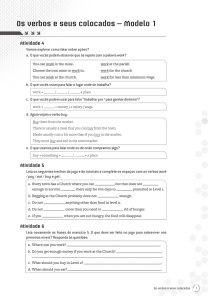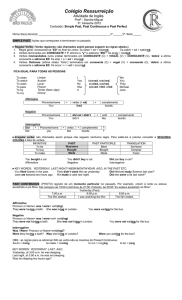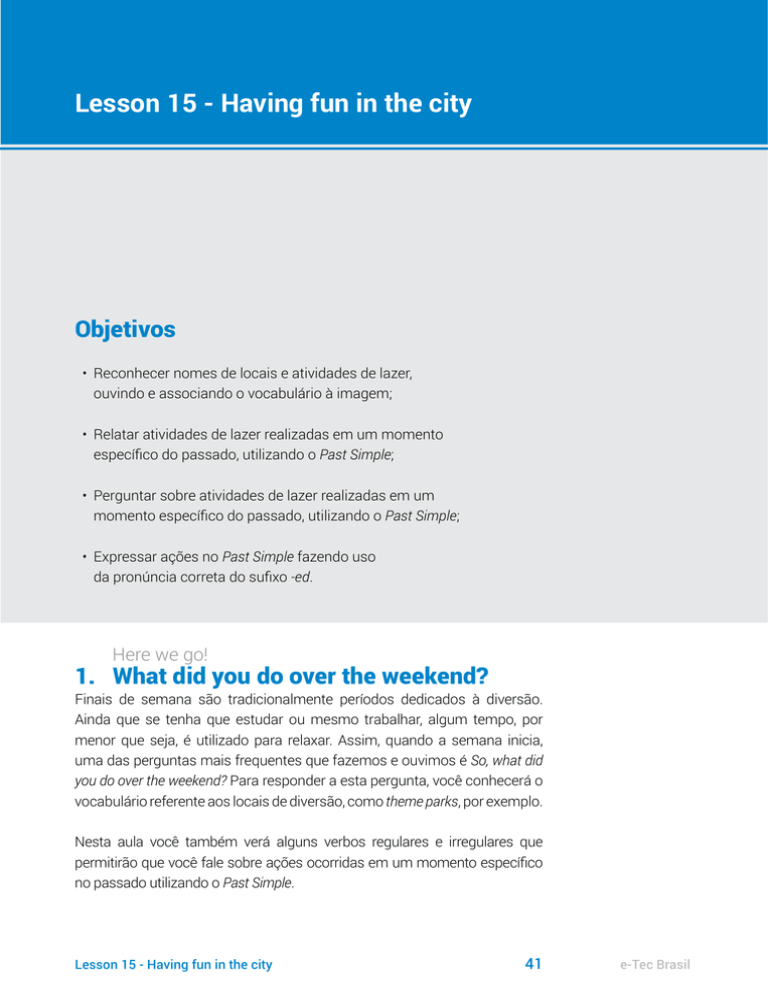
Lesson 15 - Having fun in the city
Objetivos
• Reconhecer nomes de locais e atividades de lazer,
ouvindo e associando o vocabulário à imagem;
• Relatar atividades de lazer realizadas em um momento
específico do passado, utilizando o Past Simple;
• Perguntar sobre atividades de lazer realizadas em um
momento específico do passado, utilizando o Past Simple;
• Expressar ações no Past Simple fazendo uso
da pronúncia correta do sufixo -ed.
Here we go!
1. What did you do over the weekend?
Finais de semana são tradicionalmente períodos dedicados à diversão.
Ainda que se tenha que estudar ou mesmo trabalhar, algum tempo, por
menor que seja, é utilizado para relaxar. Assim, quando a semana inicia,
uma das perguntas mais frequentes que fazemos e ouvimos é So, what did
you do over the weekend? Para responder a esta pergunta, você conhecerá o
vocabulário referente aos locais de diversão, como theme parks, por exemplo.
Nesta aula você também verá alguns verbos regulares e irregulares que
permitirão que você fale sobre ações ocorridas em um momento específico
no passado utilizando o Past Simple.
Lesson 15 - Having fun in the city
41
e-Tec Brasil
Warming up
2. Having fun in the city
Audio
Dube ainda está bastante deprimido depois da discussão entre ele e
Christine. Billy, preocupado, tenta animar o amigo levando-o para passear
em um theme park. Em alguns momentos da conversa, os garotos se
referem a ações ocorridas no passado, acompanhe o diálogo a seguir.
Billy: You didn’t get the message, did you?
Dube: It’s not that easy, Billy. I had everything planned, and she tells me that she’s
leaving town!
Integrated media
Acesse a mídia Theme
Park para acompanhar a
conversa entre Dube e Billy.
Dube: I had everything planned, and she tells me that she’s leaving town!
Billy: Maybe you’re overreacting; maybe it’s not that big of a deal.
Dube Yeah, I do need to cool down.
Billy: You should go for a ride on the roller coaster.
Dube: Yeah, it is winter, but if it’s open, I’ll go. It’s a great way to chill out. Aren’t you
coming?
Glossary
Overreacting: exagerando
Chill out: espairecer
Womanizer: cafajeste
Billy: Nah, I’m going to meet Carly at the Ferris wheel.
Dube: What a womanizer. See ya around.
Billy: Goodbye, chap.
Os theme parks são locais de entretenimento onde muitas pessoas buscam
diversão em seus momentos de descanso. Existem outras atividades
de lazer que podemos realizar e outros lugares que podemos visitar on
weekend. Acompanhe o vocabulário relacionado a fun places.
1ª ed. rev. e atual.
42
English
3. Getting the hang of it
3.1 Fun places
Quando se trata de diversão, existem vários locais onde as pessoas
reúnem-se em seu leisure time. Veja alguns deles a seguir:
Audio
Glossary
Party
rty
The movies
Theater
Park
Amusement park
Theme park
Concert
Flea market
Garage sale
Leisure time: tempo de lazer
Party: festa
The movies/cinema: cinema
Theater: teatro
Park: parque
Amusement park:
parque de diversões
Theme park: parque temático
Concert: concerto; show
Flea market: mercado de pulgas
Garage sale: venda de garagem
No diálogo que você acompanhou, Dube e Billy conversaram sobre
algumas atrações que Dube poderia experimentar para tentar se
descontrair um pouco. Veja, a seguir, o vocabulário referente a atrações
oferecidas em um amusement park ou em um theme park:
Glossary
Ferris wheel
Roler coaster
Lesson 15 - Having fun in the city
Water rides
Ferris wheels: roda-gigante
Roller coaster: montanha-russa
Water rides: tobogãs
Dark rides: trem fantasma
Dark rides
43
e-Tec Brasil
Learning activity
Fun weekend
Audio
Com este vocabulário você poderá encontrar com maior facilidade um lugar
para se divertir. Teste sua aprendizagem realizando a Activity Fun weekend.
Um park é um local convidativo para realizarmos diferentes leisure activities,
a seguir acompanhe alguns verbos relacionados a este tema.
3.2 Leisure activities
Neste tópico você poderá relembrar alguns verbos associados à leisure
activities. Nos exemplos que acompanham, os verbos estão no passado,
pois se tratam de ações que já aconteceram. Acompanhe a seguir alguns
verbos regulares:
Glossary
To play: brincar
To play a musical instrument:
tocar instrumento musical
To play game: jogar
+ jogo/esporte
To cycle: pedalar;
andar de bicicleta
To jog: correr
To hike: fazer (uma) caminhada
To skate: patinar
To roller-skate: patinar
(sobre rodas)
To sail: velejar
1ª ed. rev. e atual.
44
To play
To play (a musical instrument)
To play game
I played with my dog this
morning.
He played guitar last night.
We played some board
games on Sunday.
To cycle
To jog
To hike
He cycled from home to
work last Monday.
She jogged for an hour after
school.
They hiked in Scotland last
spring.
To skate
To roller-skate
To sail
She skated beautifully at
championship.
He roller-skated along
the street.
They sailed for hours
yesterday.
English
To skate
To roller-skate
To sail
She skated beautifully at
championship.
He roller-skated along
the street.
They sailed for hours
yesterday.
Audio
To ski
To surf
To dance
He skied for down the
montain at a high speed.
I surfed in Hawaii last
summer.
We danced a lot at
the party.
To listen to
To watch
To paint
This morning I listened to
music in my bedroom.
He watched a horror
movie on Saturday.
He painted a plate of
fruit on canvas.
To cook
To visit
To walk
They cooked a delicious
dinner.
You visited your friends
last weekend.
I walked a lot
yesterday.
Glossary
To ski: esquiar
To surf: surfar
To dance: dançar
To listen to: escutar
To watch: assistir
To paint: pintar
To cook: cozinhar
To visit: visitar
To walk: caminhar
Na tabela a seguir listamos alguns verbos irregulares:
Glossary
3
To swim: nadar
To run: correr
To read: ler
To swin
To run
To read
She swan at the beach
yesterday
They ran the marathon
on friday.
I read a great book last
weekend.
Lesson 15 - Having fun in the city
45
e-Tec Brasil
To swin
To run
To read
She swan at the beach
yesterday
They ran the marathon
on friday.
Iread a great book last
weekend.
Audio
Glossary
To write: escrever
To do: fazer
To sing: cantar
To go (somewhere):
ir a (algum lugar)
To go out: sair (socialmente)
To go shopping: ir fazer compras
To write
To do
To sing
He wrote emails to his
friends in te USA.
She did some yoga
exercises in the afternoon.
They sang together at the
party.
Zapatería
To go (somewhere)
To go out
To go shopping
She went the movies on
Sunday.
My friends and I went out
last night.
She went shopping for
clothes last week.
Aproveite para lembrar, conforme visto na Lesson 11, que você pode utilizar
a combinação verbo To Go + activity para referir-se a atividades físicas e
alguns esportes. Quando você estiver falando no passado, o Go é o verbo
que indicará este tempo. Observe:
Learning activity
Extended holiday
Fun with friends
1ª ed. rev. e atual.
Present
Past
to go dancing
went dancing
to go swimming
went swimming
to go sailing
went sailing
Agora que você já relembrou e conheceu mais alguns verbos relacionados a
leisure activites, chegou a hora de exercitá-los! Acesse as Activities Extended
holiday e Fun with friends para praticar essas novas palavras e expressões.
No tópico a seguir você conhecerá o tempo verbal Past Simple, usado
quando queremos nos referir a ações que aconteceram no passado.
46
English
3.3 Past Simple - affirmative form: regular verbs
No domingo à noite, Carly conversa com Christine sobre o que fez durante
o final de semana. Veja:
500°F
HI.
HI.
HI.
HI.
HI.
350°F
LO.
LO.
LO.
LO.
LO.
200°F
Christine: So, Carly, what did you do over the weekend? Did you go out on Saturday?
I didn’t see you or Rosa all weekend!
Carly: Yeah, I know… Well… On Saturday it was snowing, so I stayed home.
Christine: Ahan…
Carly: On Sunday the weather got better, there was even a bit of sunshine, so we
went to Six Flags Park.
Christine: Ahan… the amusement park… Did you try all the rides?
Carly: Some were closed for winter, but we had a ride on most attractions and we
enjoyed the park so much… and I went on the Ferris wheel with Billy!
Christine: Hmm…
Carly: What about you? How was your weekend?
Christine: It was terrible… I decided to stay in my bedroom all weekend and avoid
Dube. On Saturday I read a book, listened to some music and I watched TV, but
everything reminded me of him. Then on Sunday I slept all morning and in the
afternoon I wrote an article. At night I went to bed quite early. I didn’t have lunch or
dinner. I thought of my miserable life all night long when I finally slept! I didn’t call
my family as well….
Carly: Oh, I’m sorry… but a calm weekend was important for you to
organize your plans.
Christine: It truly was! And... did you hear anything from Dube?
Carly: Yes, I did!
Lesson 15 - Having fun in the city
47
e-Tec Brasil
Carly e Christine estão referindo-se a ações que aconteceram over the weekend,
por este motivo, os verbos que designam estas ações estão no passado.
Audio
Você já viu na Lesson 14, ao estudar o Past Simple, que este tempo verbal se
limita a ações concluídas e que ocorreram em um momento determinado
(quer dizer, sabido ou conhecido) e específico. Seus verbos dividem-se
em dois grupos, regular e irregular. Aos verbos regulares acrescenta-se a
terminação -ed. Já os irregulares assumem diferentes conjugações.
Em português, dizer: “Eu fui ao cinema” e “Eu fui ao cinema ontem”, não
implica utilizar tempos verbais diferentes, é apenas uma questão de se dar
mais informação. Já em inglês, o fato de especificar quando (no passado)
a ação ocorreu indica o uso do Past Simple. Observe o exemplo:
Nós dançamos no pub ontem.
We danced at the pub yesterday.
No exemplo que você acaba de ler, o uso do advérbio de tempo yesterday
indica que a oração deve empregar o PastSimple. E danced por ter a
terminação -ed pertence ao grupo dos regular verbs.
É necessário um pouco de atenção à escrita dos regular verbs ao
acrescentar-se o -ed, pois podem acontecer modificações. Observe:
Se o verbo já termina em “e”, não é necessário repeti-lo: apenas acrescentase “d”. Por exemplo:
Infinitive
Past simple
cycle
cycled
skate
skated
Se o verbo terminado em “y” for precedido por uma vogal, apenas
acrescenta-se o -ed. Entretanto, se ele terminar em “y” precedido por uma
consoante, retira-se o “y” e acrescenta-se -ied. Observe:
1ª ed. rev. e atual.
48
Infinitive
Past simple
play
played
study
studied
English
Se o verbo tem uma sílaba e suas três últimas letras são a sequência
consoante + vogal + consoante (CVC), antes de o -ed ser acrescentado
repete-se a última letra do verbo. Verifique:
Infinitive
Past simple
stop
stopped
drop
dropped
jog
jogged
plan
planned
Audio
O mesmo ocorre se o verbo tiver as seguintes características: duas
sílabas; suas três últimas letras forem uma sequência de consoante +
vogal + consoante (CVC); a sílaba tônica (stressed syllable) for a última.
Por exemplo:
Infinitive
Past simple
regret
regretted
Se o verbo termina em “ic”, acrescenta-se “k” antes do -ed. Por exemplo:
Infinitive
Past simple
panic
panicked
As regras apresentadas se aplicam aos verbos regulares. A seguir você
conhecerá a conjugação de alguns verbos irregulares do Past Simple.
Lesson 15 - Having fun in the city
49
e-Tec Brasil
3.4 Past Simple - affirmative form: irregular verbs
Em relação aos irregular verbs, é inevitável ter que memorizar suas
formas de Past Simple. Para estudá-las, os verbos podem ser organizados
em grupos, de acordo com a escrita. Acompanhe:
• Verbos que não mudam sua forma:
Getting on
Acesse a mídia Irregular Verbs
- Past Simple para ter acesso
a uma lista mais completa de
verbos irregulares no passado. Para escutar a pronúncia dos
verbos, acesse o Dicionário
Cambridge online em http://
dictionary.cambridge.org/
INFINITIVE
PAST SIMPLE
PORTUGUÊS
to cost
cost
custar
to cut
cut
cortar
to fit
fit
servir; caber
to hurt
hurt
ferir; machucar; doer
to let
let
deixar; permitir
to put
put
colocar
to quit
quit
deixar; abandonar
(uma atividade)
to read
read
ler
to shut
shut
fechar
INFINITIVE
PAST SIMPLE
PORTUGUÊS
to begin
began
começar
to break
broke
quebrar
to bring
brought
trazer
to build
built
construir
to buy
bought
comprar
to choose
chose
escolher
to drink
drank
beber
to eat
ate
comer
to feel
felt
sentir
to fly
flew
voar
to forget
forgot
esquecer
to get
got
conseguir
to give
gave
dar
to have
had
ter; possuir
to hide
hid
esconder
to know
knew
saber; conhecer
to leave
left
sair; deixar
• Verbos que mudam sua forma:
1ª ed. rev. e atual.
50
English
INFINITIVE
PAST SIMPLE
PORTUGUÊS
to lose
lost
perder
to make
made
fazer
to meet
met
encontrar (pessoas)
to pay
paid
pagar
to ride
rode
andar
to say
said
dizer
to see
saw
ver
to sell
sold
vender
to send
sent
enviar
to show
showed
mostrar
to sing
sang
cantar
to sit
sat
sentar(-se)
to sleep
slept
dormir
to speak
spoke
falar
to spend
spent
gastar (dinheiro) /
passar (tempo)
to take
took
pegar
to teach
taught
ensinar
to tell
told
contar
to think
thought
pensar; achar
to understand
understood
compreender
to wake
woke
acordar
to wear
wore
vestir; usar
to write
wrote
escrever
Mind the gap
O verbo Ride acompanha
vários substantivos quando se
quer dizer que “andamos de
alguma coisa”, por exemplo:
ride a bike, ride a horse, ride the
rollar coaster.
Mind the gap
O verb To take, ao ser
acompanhado por diferentes
substantivos, assumirá:
diferentes sentidos.
Veja:
take a bus
take a medicine
take a shower
take photos
take a look
Após estudar diversos verbos no Past Simple, é importante praticá-los
para que você possa utilizá-los de maneira adequada. Por isso, acesse
as Activities Weekend e 24h out. No próximo tópico você estudará a forma
negativa e interrogativa do Past Simple.
Lesson 15 - Having fun in the city
51
Learning activity
Weekend
24h out
e-Tec Brasil
3.5 Past Simple - negative and interrogative forms
Audio
Nas Lessons anteriores você estudou o Present Simple e o uso do verbo
auxiliar do. Antes de conhecer o auxiliar do passado, veja alguns exemplos
do uso deste auxiliary verb no presente:
Present Simple
Affirmative
Negative
Interrogative
They go to the park
on Sundays.
They don’t go to the
park on Sundays.
Do they go to the
park on Sundays?
She enjoys the rides
on the roller coaster.
She doesn’t enjoy
the rides on the
roller coaster.
Does she enjoy the rides
on the roller coaster?
Para formar o Past Simple, substitui-se do (auxiliar verb no presente) por did
(auxiliar verb no passado).
No diálogo a seguir, Christine não contém sua curiosidade, e pergunta
a Carly sobre Dube. Observe o modo como as ações do passado estão
sendo contadas:
Christine: And... did you hear anything from Dube?
Carly: Well…. I know he’s pretty upset! He went to the theme park with Billy. He didn’t
really enjoy the rides! They talked about you... and Dube misses you, but he didn’t like
Mind the gap
Wanna é uma forma abreviada
de want to, utilizado em
contexto informal.
your reaction at the restaurant… He won a duck toy at the high striker and threw it away.
Christine: I also didn’t like the fact but he doesn’t want me to go to NY. See, I don’t
wanna hear from Dube anymore! And I didn’t want that stupid duck toy anyway...
Carly: O... K…
1ª ed. rev. e atual.
52
English
Observe que na pergunta de Christine sobre Dube ela utilizou did, que está
posicionado antes do sujeito. Veja:
Audio
Did you hear anything from Dube?
Já nas frases negativas, as garotas usam didn’t que é a contração de did
junto à partícula negativa not. Verifique:
He didn’t really enjoy the rides!
A tabela a seguir sintetiza o uso do Past Simple nas formas afirmativas
(uso dos verbos regulares e irregulares), negativas (uso do didn’t e verbo no
infinitivo) e interrogativas (uso do did antes do sujeito e verbo no infinitivo):
Affirmative
Negative
Interrogative
He went to the
theme park.
He didn’t go to the
theme park.
Did he go to the
theme park?
Chegou a hora de praticar os conteúdos estudados até este momento.
Para isso, realize as Activities Victor’s trip, Carly and Billy e Rosa’s trip! O final
-ed dos verbos no Past Simple possui variações quanto a sua pronúncia.
Este será o tema abordado no tópico a seguir.
Learning activity
Victor’s trip
Carly and Billy
Rosa’s trip
Out loud
3.6 Pronunciation of -ed endings
Os sons da língua materna muitas vezes influenciam a forma como as
pessoas pronunciam os da língua estrangeira. No caso do português e
do inglês, o final -ed dos verbos regulares costuma gerar um pequeno
problema para os brasileiros, pois ele não é pronunciado como se imagina
ou como é nossa tendência natural, quer dizer, como se fosse “êd” ou “éd”.
Existem três possíveis pronúncias para o final -ed, e qual delas deve ser
utilizada depende do som final do verbo no infinitivo. Observe:
• Verbos terminados em som de l - n - m - r - b - v - g - w - y - z ou ditongos
têm o final -ed com a pronúncia de /d/.
Lesson 15 - Having fun in the city
53
e-Tec Brasil
Audio
Infinitive
Past Simple
to call
called
to clean
cleaned
to perform
performed
to repair
repaired
to comb
combed
to live
lived
to tag
tagged
to allow
allowed
to cry
cried
to buzz
buzzed
to play
played
• Verbos terminados em p - k - s - ch - sh - f - x têm o final -ed com a pronúncia
de /t/.
1ª ed. rev. e atual.
54
Infinitive
Past Simple
to stop
stopped
to look
looked
to miss
missed
to watch
watched
to wash
washed
to stuff
stuffed
to mix
mixed
English
Verbos terminados em t e d têm o final -ed com a pronúncia de /id/.
Infinitive
Past Simple
to end
ended
to add
added
to hunt
hunted
to need
needed
to fold
folded
to sound
sounded
to count
counted
Audio
Repetir essas palavras ajudará a aperfeiçoar a sua pronúncia. Após
exercitar seu listening e seu speaking, acompanhe uma breve descrição
sobre a tradição dos parques temáticos nos Estados Unidos.
Catching a glimpse
4. Theme parks in the USA
Glossary
One of the favorite leisure activities for American people and for tourists
visiting the USA is going to an amusement park or a theme park. They consist
of a group of entertainment attractions, rides, and other events in a location
for the enjoyment of large numbers of people. In common language, the
terms theme park and amusement park are often synonymous. However,
a theme park can be regarded as a distinct style of amusement park. A
Lesson 15 - Having fun in the city
55
To be regarded: ser considerado
Landscaping: paisagismo
Buildings: prédios
To range: variar
Smaller: menor(es)
Simpler: mais simples
Have emerged: surgiram
Admission fees: taxa de entrada
No charge: sem pagar
To purchase: comprar, adquirir
Either... or...: ou... ou ...
Exchange method:
método de troca
Token: ficha (tipo moeda)
To charge: cobrar
Single: único/a
As often as: tão frequentemente
(tantas vezes) quanto
Wish: querer
Fare on sale: tarifa à venda
Entire: inteiro
The newest: as atrações
mais novas
Holders priority: prioridade
aos portadores
e-Tec Brasil
theme park has landscaping, buildings, and attractions that are based on
one or more specific themes or stories, such as a movie, comics or cartoon
characters and even wild and sea animals.
The amusement park industry’s offerings range from large theme parks
such as Walt Disney World and Universal Studios Hollywood to smaller and
medium-sized theme parks. Even simpler theme parks aimed at smaller
children have emerged, such as Legoland. Traditional amusement parks
now also have these competition areas in addition to their thrill rides.
Amusement parks survive from admission fees paid by guests attending
the park, and their profit is complemented by parking fees, food and
beverage sales and souvenirs.
Practically all amusement parks operate using one of two admission
principles: pay-as-you-go or pay-one-price. In amusement parks using the
pay-as-you-go scheme, a guest enters the park at little or no charge. He/
she must then purchase rides individually, either at the attraction’s entrance
or by purchasing ride tickets (or a similar exchange method, like a token).
On the other hand, an amusement park using the pay-one-price scheme
will charge guests a single, large admission fee. The guests can then use
most of the attractions in the park as often as they wish during their visit.
A daily admission pass (day pass) is the most basic fare on sale, but there
are season tickets which offer admission for the entire operating year (plus
special privileges for the newest attractions), and express passes (or VIP)
passes which give holders priority in the lines for popular attractions.
1ª ed. rev. e atual.
56
English
5. That’s a wrap
Enquanto visitavam o theme park, num domingo, Dube conversou com Billy
sobre seu desentendimento com Christine. A partir dessa situação você
conheceu algumas palavras relacionadas ao universo de um amusement
ou theme park. Ainda no theme park, Billy encontrou Carly e eles também
conversaram sobre a situação de Dube.
Na segunda, Carly comenta com Christine que viu Dube no parque e ela fica
curiosa para saber mais detalhes sobre o que aconteceu. Nessa conversa
elas utilizaram verbos no Past Simple. Com este tempo verbal é possível
falar de ações que aconteceram num momento determinado no passado.
Você também estudou alguns verbos regulares e irregulares no Past Simple,
bem como o uso do did para compor frases interrogativas e negativas.
Lesson 15 - Having fun in the city
57
e-Tec Brasil
1ª ed. rev. e atual.
58
English

